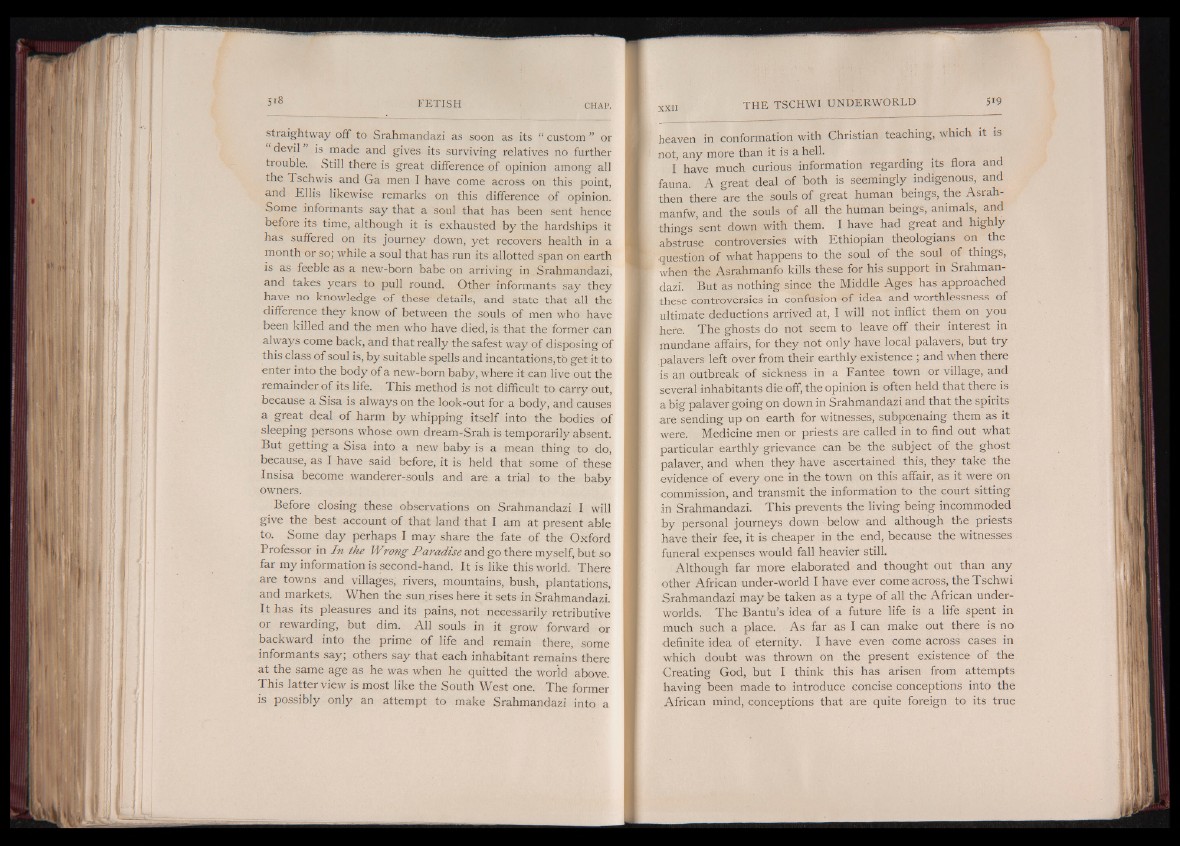
straightway off to Srahmandazi as soon as its “ custom ” or
devil is made and gives its surviving relatives no further
trouble. Still there is great difference of opinion among all
the Tschwis and Ga men I have come across on this point,
and Ellis likewise remarks on this difference of opinion.
Some informants say that a soul that has been sent hence
before its time, although it is exhausted by the hardships it
has suffered on its journey down, yet recovers health in a
month or so; while a soul that has run its allotted span on earth
is as feeble as a new-born babe on arriving in Srahmandazi,
and takes years to pull round. Other informants say they
have no knowledge of these details, and state that all the
difference they know of between the souls of men who have
been killed and the men who have died, is. that the former can
always come back, and that really the safest way of disposing of
this class of soul is, by suitable spells and incantations, tb get it to
enter into the body of a new-born baby, where it can live out the
remainder of its life. This method is not difficult to carry out,
because a Sisa is always on the look-out for a body, and causes
a great deal of harm by whipping itself into the bodies of
sleeping persons whose own dream-Srah is temporarily absent.
But getting a Sisa into a new baby is a mean thing to do,
because, as I have said before, it is held that some of these
Insisa become wanderer-souls and are a trial to the baby
owners.
Before closing these observations on Srahmandazi I will
give the best account of that land that I am at present able
to. Some day perhaps I may share the fate of the Oxford
Professor in In the Wrong Paradise and go there myself, but so
far my information is second-hand. It is like this world. There
are towns and villages, rivers, mountains, bush, plantations,
and markets. When the sun rises here it sets in Srahmandazi.
It has its pleasures and its pains, not necessarily retributive
or rewarding, but dim. All souls in it grow forward or
backward into the prime of life and remain there, some
informants say; others say that each inhabitant remains there
at the same age as he was when he quitted the world above.
This latter view is most like the South West one. The former
is possibly only an attempt to make Srahmandazi into a
heaven in conformation with Christian teaching, which it is
not, any more than it is a hell. -
I have much curious information regarding its flora and
fauna. A great deal of both is seemingly indigenous, and
then there are the souls of great human beings, the Asrah-
manfw, and the souls of all the human beings, animals, and
things sent down with them. I have had great and highly
abstruse controversies with Ethiopian theologians on the
question of what happens to the soul of the soul of things,
when the Asrahmanfo kills these for his support in Srahmandazi.
But as nothing since the Middle Ages has approached
these controversies in confusion of idea and worthlessness of
ultimate deductions arrived at, I will not inflict them on you
here. The ghosts do not seem to leave off their interest in
mundane affairs, for they not only have local palavers, but try
palavers left over from their earthly existence ; and when there
is an outbreak of sickness in a Fan tee town or village, and
several inhabitants die off, the opinion is often held that there is
a big palaver going on down in Srahmandazi and that the spirits
are sending up on earth for witnesses, subpoenaing them as it
were. Medicine men or priests are called in to find out what
particular earthly grievance can be the subject of the ghost
palaver, and when they have ascertained this, they take the
evidence of every one in the town on this affair, as it were on
commission, and transmit the information to the court sitting
in Srahmandazi. This prevents the living being incommoded
by personal journeys down below and although the priests
have their fee, it is cheaper in the end, because the witnesses
funeral expenses would fall heavier still.
Although far more elaborated and thought out than any
other African under-world I have ever come across, theTschwi
Srahmandazi may be taken as a type of all the African underworlds.
The Bantu’s idea of a future life is a life spent in
much such a place. As far as I can make out there is no
definite idea of eternity. I have even come across cases in
which doubt was thrown on the present existence of the
Creating God, but I think this has arisen from attempts
having been made to introduce concise conceptions into the
African mind, conceptions that are quite foreign to its true